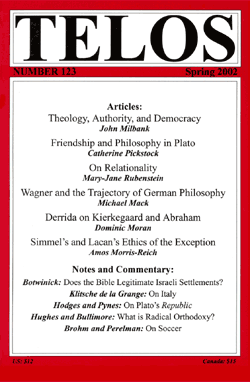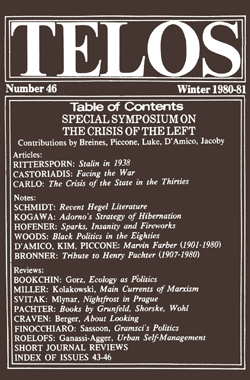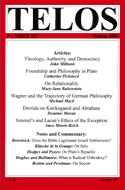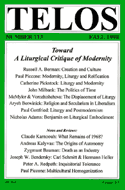By Kyle Nicholas · Thursday, October 22, 2015  Mention “Radical Orthodoxy” in a room of people who are either quite intimately or only remotely acquainted with contemporary theology, and one surely will receive equal parts of praise and scorn. Whether it is being praised or scorned, however, it is plain that Radical Orthodoxy has worked its way deep into the fabric of contemporary theological discourse. Since the publication of John Milbank’s Theology and Social Theory in 1992, Catherine Pickstock’s After Writing in 1997, and Radical Orthodoxy: A New Theology, edited by Milbank, Pickstock, and Graham Ward in 1998, the Radical Orthodoxy movement has done what any explosively innovative intellectual movement will do after the hype settles down: mature or wither away. Mention “Radical Orthodoxy” in a room of people who are either quite intimately or only remotely acquainted with contemporary theology, and one surely will receive equal parts of praise and scorn. Whether it is being praised or scorned, however, it is plain that Radical Orthodoxy has worked its way deep into the fabric of contemporary theological discourse. Since the publication of John Milbank’s Theology and Social Theory in 1992, Catherine Pickstock’s After Writing in 1997, and Radical Orthodoxy: A New Theology, edited by Milbank, Pickstock, and Graham Ward in 1998, the Radical Orthodoxy movement has done what any explosively innovative intellectual movement will do after the hype settles down: mature or wither away.
In their article “What is Radical Orthodoxy?” (Telos 123, Spring 2002), John Hughes and Matthew Bullimore map out, in a short space and yet with crisp detail, the main themes in the Radical Orthodoxy project. For those familiar with the movement, their points will not come as a shock: that a deep metaphysical violence underlies modernity, political liberalism, and capitalism; that the philosophical and theological dualisms of modernity must be named and then overcome with the aid of both premodern and postmodern thought; and that in the face of proliferating violence it is Christian orthodoxy—in line with Aquinas, Boethius, Augustine, Gregory of Nyssa, and Iamblichean Neo-Platonism—that presents truly “radical” alternatives to the prevailing political, philosophical, and theological orders.
Continue reading →
By Sean McMorrow · Tuesday, October 13, 2015  “Facing the War” is a translation from the first section of Devant la guerre, Cornelius Castoriadis’s least regarded work within English-speaking circles. The reason for this marginalization is its central claim that Russian society had transformed into a stratocratic regime, with increased probability for an escalation into a Third World War. Castoriadis’s critics claimed he had missed signs of perestroika and glasnost already on the horizon. Viewed from this perspective, history could not have been more cruel to Castoriadis. However, the value of his work does not depend on a predictive mode of political analysis, a point that is clearly prefaced in this work: calls for predictive accuracy ignore the radical character of historical contingency. In fact, the unexpected events put into motion later by Gorbachev only strengthen Castoriadis’s perspective in the sense that such a development represents the deeper problem of historical indeterminacy, and it is in this respect that his analysis is finely tuned to any society’s condition of historical contingency. “Facing the War” is a translation from the first section of Devant la guerre, Cornelius Castoriadis’s least regarded work within English-speaking circles. The reason for this marginalization is its central claim that Russian society had transformed into a stratocratic regime, with increased probability for an escalation into a Third World War. Castoriadis’s critics claimed he had missed signs of perestroika and glasnost already on the horizon. Viewed from this perspective, history could not have been more cruel to Castoriadis. However, the value of his work does not depend on a predictive mode of political analysis, a point that is clearly prefaced in this work: calls for predictive accuracy ignore the radical character of historical contingency. In fact, the unexpected events put into motion later by Gorbachev only strengthen Castoriadis’s perspective in the sense that such a development represents the deeper problem of historical indeterminacy, and it is in this respect that his analysis is finely tuned to any society’s condition of historical contingency.
Castoriadis’s analysis here is an updated version of the assessment of Russian society that had been developed within Socialisme ou Barbarie. Castoriadis makes a compelling argument that Russia had regenerated itself into a full-blown stratocracy, armed to the teeth and yet still unable to provide its citizens with a functional civic bureaucracy; a decade later he reflects that a core argument of “Facing the War” was that brute force had become the sole signification holding this society together. Castoriadis’s argument operates at two levels: as a political analysis of Russian bureaucratic spheres (the comparison of military capacity between superpowers and a critique of rational determinism within the justification of Cold War strategy—i.e., M.A.D.); and as a political judgement of the imaginary significations that served to orient Russian society. It is through the latter level that lessons on historical contingency are astutely relevant to the contemporary world situation.
Continue reading →
By Lukas Szrot · Wednesday, September 9, 2015 Anthony M. Matteo’s “In Defense of Moral Realism” offers a fascinating argument. He begins with the seemingly innocuous premise that philosophy, and by extension theorizing of any stripe, should be linked to what people actually do. Philosophy of science is his analogue, the obtuse, jargon-laden pages of such work often seeming to generate little useful insight for the practitioners of science. An account of morality, by analogy, should be useful to practicing moral agents.
Continue reading →
By Kyle Nicholas · Tuesday, July 21, 2015  In his article “The Last of the Last: Theology, Authority, and Democracy,” from Telos 123 (Spring 2002), John Milbank argues that theology’s proper role is within the Church extended through time and space, rather than as “‘a public discourse’ answerable to the critical norms and liberal values.” Yet his claim does not come without qualification. Many aspects of theological inquiry that were once held together have splintered since 1300 CE: faith and reason, scripture and tradition, and theology under ecclesial authority, in particular. Here the Church is actually more to blame, both Protestantism and Post-Tridentine Catholicism, than some (fictional) increasingly enlightened and liberated society. In his article “The Last of the Last: Theology, Authority, and Democracy,” from Telos 123 (Spring 2002), John Milbank argues that theology’s proper role is within the Church extended through time and space, rather than as “‘a public discourse’ answerable to the critical norms and liberal values.” Yet his claim does not come without qualification. Many aspects of theological inquiry that were once held together have splintered since 1300 CE: faith and reason, scripture and tradition, and theology under ecclesial authority, in particular. Here the Church is actually more to blame, both Protestantism and Post-Tridentine Catholicism, than some (fictional) increasingly enlightened and liberated society.
Continue reading →
By Lukas Szrot · Tuesday, July 7, 2015 The aftermath of the War on Terror rages on despite bipartisan assurances that “major combat operations are over” and that “the war is coming to a close.” This ongoing conflict has produced, and continues to produce, prodigious human casualties and economic hemorrhaging. Tim Luke’s words regarding September 11, 2001, are in many ways as timely today as they were nearly fourteen years ago.
Continue reading →
By Kyle Nicholas · Monday, June 22, 2015  Catherine Pickstock’s “Liturgy and Modernity,” from Telos 113 (Fall 1998), is an effort to find an alternative to liberal individualism and social fragmentation in modernity. Pickstock finds this alternative in liturgy: a liturgical critique of modernity where “liturgy” functions as a thoroughly political category. Liturgy is specially equipped to confront modernity due to its nature as ritual behavior (and therefore universal among humans). Yet the liturgical is to be favored over “ritual” for two reasons. First, ritual has already been relegated to its own “delimited sphere” in modernity, where it is viewed as a private superstructural category. Furthermore, ritual in the modern mind is regarded merely as “mechanical repetitions divorced from any informing narrative.” Liturgy, on the other hand, responds to the former challenge by its nature as “a pattern of social action” (not a delimited sphere) and responds to the latter by its foundation in a “privileged transcendent signifier.” Catherine Pickstock’s “Liturgy and Modernity,” from Telos 113 (Fall 1998), is an effort to find an alternative to liberal individualism and social fragmentation in modernity. Pickstock finds this alternative in liturgy: a liturgical critique of modernity where “liturgy” functions as a thoroughly political category. Liturgy is specially equipped to confront modernity due to its nature as ritual behavior (and therefore universal among humans). Yet the liturgical is to be favored over “ritual” for two reasons. First, ritual has already been relegated to its own “delimited sphere” in modernity, where it is viewed as a private superstructural category. Furthermore, ritual in the modern mind is regarded merely as “mechanical repetitions divorced from any informing narrative.” Liturgy, on the other hand, responds to the former challenge by its nature as “a pattern of social action” (not a delimited sphere) and responds to the latter by its foundation in a “privileged transcendent signifier.”
Continue reading →
|
|
 Mention “Radical Orthodoxy” in a room of people who are either quite intimately or only remotely acquainted with contemporary theology, and one surely will receive equal parts of praise and scorn. Whether it is being praised or scorned, however, it is plain that Radical Orthodoxy has worked its way deep into the fabric of contemporary theological discourse. Since the publication of John Milbank’s Theology and Social Theory in 1992, Catherine Pickstock’s After Writing in 1997, and Radical Orthodoxy: A New Theology, edited by Milbank, Pickstock, and Graham Ward in 1998, the Radical Orthodoxy movement has done what any explosively innovative intellectual movement will do after the hype settles down: mature or wither away.
Mention “Radical Orthodoxy” in a room of people who are either quite intimately or only remotely acquainted with contemporary theology, and one surely will receive equal parts of praise and scorn. Whether it is being praised or scorned, however, it is plain that Radical Orthodoxy has worked its way deep into the fabric of contemporary theological discourse. Since the publication of John Milbank’s Theology and Social Theory in 1992, Catherine Pickstock’s After Writing in 1997, and Radical Orthodoxy: A New Theology, edited by Milbank, Pickstock, and Graham Ward in 1998, the Radical Orthodoxy movement has done what any explosively innovative intellectual movement will do after the hype settles down: mature or wither away.  “Facing the War” is a translation from the first section of Devant la guerre, Cornelius Castoriadis’s least regarded work within English-speaking circles. The reason for this marginalization is its central claim that Russian society had transformed into a stratocratic regime, with increased probability for an escalation into a Third World War. Castoriadis’s critics claimed he had missed signs of perestroika and glasnost already on the horizon. Viewed from this perspective, history could not have been more cruel to Castoriadis. However, the value of his work does not depend on a predictive mode of political analysis, a point that is clearly prefaced in this work: calls for predictive accuracy ignore the radical character of historical contingency. In fact, the unexpected events put into motion later by Gorbachev only strengthen Castoriadis’s perspective in the sense that such a development represents the deeper problem of historical indeterminacy, and it is in this respect that his analysis is finely tuned to any society’s condition of historical contingency.
“Facing the War” is a translation from the first section of Devant la guerre, Cornelius Castoriadis’s least regarded work within English-speaking circles. The reason for this marginalization is its central claim that Russian society had transformed into a stratocratic regime, with increased probability for an escalation into a Third World War. Castoriadis’s critics claimed he had missed signs of perestroika and glasnost already on the horizon. Viewed from this perspective, history could not have been more cruel to Castoriadis. However, the value of his work does not depend on a predictive mode of political analysis, a point that is clearly prefaced in this work: calls for predictive accuracy ignore the radical character of historical contingency. In fact, the unexpected events put into motion later by Gorbachev only strengthen Castoriadis’s perspective in the sense that such a development represents the deeper problem of historical indeterminacy, and it is in this respect that his analysis is finely tuned to any society’s condition of historical contingency.  In his article “The Last of the Last: Theology, Authority, and Democracy,” from Telos 123 (Spring 2002), John Milbank argues that theology’s proper role is within the Church extended through time and space, rather than as “‘a public discourse’ answerable to the critical norms and liberal values.” Yet his claim does not come without qualification. Many aspects of theological inquiry that were once held together have splintered since 1300 CE: faith and reason, scripture and tradition, and theology under ecclesial authority, in particular. Here the Church is actually more to blame, both Protestantism and Post-Tridentine Catholicism, than some (fictional) increasingly enlightened and liberated society.
In his article “The Last of the Last: Theology, Authority, and Democracy,” from Telos 123 (Spring 2002), John Milbank argues that theology’s proper role is within the Church extended through time and space, rather than as “‘a public discourse’ answerable to the critical norms and liberal values.” Yet his claim does not come without qualification. Many aspects of theological inquiry that were once held together have splintered since 1300 CE: faith and reason, scripture and tradition, and theology under ecclesial authority, in particular. Here the Church is actually more to blame, both Protestantism and Post-Tridentine Catholicism, than some (fictional) increasingly enlightened and liberated society.  Catherine Pickstock’s “Liturgy and Modernity,” from Telos 113 (Fall 1998), is an effort to find an alternative to liberal individualism and social fragmentation in modernity. Pickstock finds this alternative in liturgy: a liturgical critique of modernity where “liturgy” functions as a thoroughly political category. Liturgy is specially equipped to confront modernity due to its nature as ritual behavior (and therefore universal among humans). Yet the liturgical is to be favored over “ritual” for two reasons. First, ritual has already been relegated to its own “delimited sphere” in modernity, where it is viewed as a private superstructural category. Furthermore, ritual in the modern mind is regarded merely as “mechanical repetitions divorced from any informing narrative.” Liturgy, on the other hand, responds to the former challenge by its nature as “a pattern of social action” (not a delimited sphere) and responds to the latter by its foundation in a “privileged transcendent signifier.”
Catherine Pickstock’s “Liturgy and Modernity,” from Telos 113 (Fall 1998), is an effort to find an alternative to liberal individualism and social fragmentation in modernity. Pickstock finds this alternative in liturgy: a liturgical critique of modernity where “liturgy” functions as a thoroughly political category. Liturgy is specially equipped to confront modernity due to its nature as ritual behavior (and therefore universal among humans). Yet the liturgical is to be favored over “ritual” for two reasons. First, ritual has already been relegated to its own “delimited sphere” in modernity, where it is viewed as a private superstructural category. Furthermore, ritual in the modern mind is regarded merely as “mechanical repetitions divorced from any informing narrative.” Liturgy, on the other hand, responds to the former challenge by its nature as “a pattern of social action” (not a delimited sphere) and responds to the latter by its foundation in a “privileged transcendent signifier.” 

